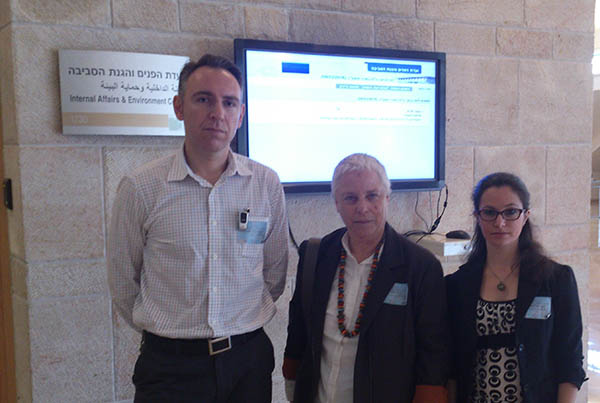Victims killed with the off-duty guns of private security firms
Background
Clause 10c of Israel’s Gun Law, enacted in 2008, restricted the gun licenses of private security guards to bearing arms at their worksites and during their work hours. The clause remained unenforced until the summer of 2013, when (per the 2014 report of Israel’s State Comptroller) GFKT advocacy led to a ministerial decision to initiate enforcement. In the five years between enactment and enforcement (2002-2013) 20 persons were killed with the off-duty arms of security firms which were stored in guards’ homes. Following enforcement, killings with off-duty company guns stopped altogether and for four years not one person was killed with the gun of a security firm in the guard’s home or family.
Backlash and ensuing policy changes then reversed this trend once again:
In November 2014, following an attack at a Jerusalem synagogue, the Minister of Public Security restored authorization to bear the arms of security firms beyond guards’ worksites and work hours. However, Israeli press reported at the time that most security guards continued depositing company guns at worksites at the end of shifts. Then, in early 2016, following an armed attack on civilians in Tel Aviv, a new Minister of Public Security, Gilad Erdan, initiated an amendment to Clause 10c effectively bypassing the clause and allowing him full discretion to issue repeated Executive Orders authorizing companies to send guards home with guns, “towards the protection of public security.” Ever since, the minister has repeatedly renewed authorization to bear company arms indiscriminately, without demonstrating any data or concrete findings indicating that the practice protects public security.
No statistics have been provided by official sources on the number of guards bearing company arms after duty. However, in the summer of 2017, killings in homes with the off-duty arms of security firms resumed. By January 2020, such killings had taken the lives of three women and a man.
Since its foundation, GFKT has worked – and continues to work – consistently against the policies and practices allowing the arms of security firms to be borne off-duty. Below are examples of some of the strategies we have used and some of the practical steps we have taken.
2020 – 50% of security guards instructed to deposit firearms on-site at the end of work shifts
In February 2020, the Ministry of Public Security instructed private security firms to restore the practice of collecting company firearms at the end of guards’ work shifts, for half of all security guards. This instruction means that 14,000 homes and families will be freed of the guns of security firms by the summer of 2020. The instruction was issued over a year after GFKT petitioned the High Court of Justice (Bagatz) contesting Israel’s small arms policy, and over six months after the court instructed the state to collect and present it with the improved policy decisions it claimed to be working on. Tragically, it was issued very soon after yet another woman, Yelena Itzhakbaev, was murdered in her home with the off duty-gun of a security guard. He was her partner. The former (unfortunately truncated) period of enforcement, when security firms collected their off-duty arms, during which no victims killed with such guns, indicates that this achievement is literally lifesaving. It is, however, a very partial one. Fifty percent of security guards will continue to take home company guns and most of the components of Israel’s dangerous small arms policy remain in place.

Galit Lubetzky, Rela Mazali, Roman Litrovnik, March 9 2016
GFKT’s independent survey, monitoring implementation of the 2013 directive to deposit company guns
In the first months of 2014, GFKT conducted an act of civil monitoring gauging the implementation of the new directive (as of August 2013) that security firms’ off-duty guns be deposited at worksites. A sample of 126 security guards employed by over 10 companies in seven cities and towns were interviewed by GFKT, at a varied range of public institutions and businesses. Statistician Iris Zamir, who oversaw the survey, said, “Due to its scope and variety, the survey sample can be assumed to represent the reality of most security guard firms, at most of the sites where guards are stationed.”
The GFKT survey clearly confirmed implementation of the new directives. It identified a dramatic drop in the distinct over-armament of the security guard industry. The number of unarmed security guards almost doubled over the period preceding the survey, reaching nearly 64% and demonstrating clearly that numerous guards had been (and are still) armed unnecessarily. Among the armed guards (accounting for slightly more than a third of all security guards), the survey found a pronounced change in gun storage practices – 85% of the armed guards reported storing their guns at work at the end of each work shift, in keeping with new procedures which they said had come into force very recently (See for instance: “Survey: 15% of security guards take home guns at the end of work shifts,” Haaretz, 7 March 2014. [In Hebrew].)
The practical significance of these findings was momentous: thousands of homes and families stopped servicing the security guard industry as a cheap arms cache. For thousands of women faced with domestic violence, the removal of a lethal firearm meant a meaningfully reduced death threat. This development constituted a major achievement for Gun Free Kitchen Tables, advancing disarmament of the civil and domestic spheres.
Monitoring the role of private security guards during attacks by Palestinians
Taking civil action to correct authorities’ total failure to provide systematic, reliable data, GFKT initiated a process of independent fact-finding and verification on all shooting incidents from early October through the end of December 2015, a period of multiple attacks by individual Palestinians. The accelerated effort drew on and cross-checked reports in Israeli and Palestinian media in both Hebrew and English. Our analysis indicates a policy of actively encouraging shooting-to-kill assailants or suspected assailants, or at the very least of overlooking such shootings.
166 shootings were reported in the last three months of 2015, mostly (though not all) in response to attacks or to suspected attacks by Palestinians. 118 people were shot dead by Israelis during these months and 48 people were wounded. The data collected in this period demonstrated the total lack of any factual basis for claims by the Minister of Public Security that added protection from terrorist acts was provided by his amendment to Gun Law authorizing guards to bear company guns at all times. During the three months monitored by GFKT, off-duty security guards played no role whatsoever in stopping attacks or suspected attacks even though an Executive Order was already in place, allowing them to bear company guns indiscriminately. Guards participated in just 14 out of a total of 166 shooting incidents. All of these were on duty at the time.
Writing and submitting an Expert Gender Opinion
Israel’s Women’s Equal Rights Law stipulates that every new piece of legislation potentially impacting women should be accompanied by a Gender Opinion when presented to Knesset legislators. This law, however, is not implemented consistently. In addition, some of the Gender Opinions that are presented are not sufficiently researched.
A law allowing private security firms to store their guns in guards’ homes creates a direct threat to guards’ partners and to other women in their families. The potential impacts of such a law on women are grave and far-reaching. Accordingly, in January 2016, the (then) 13 organizations of the GFKT Coalition along with 7 other women’s organizations, submitted an Independent Gender Opinion regarding an amendment to Gun Law proposed at the time by the Minister of Public Security. The document drew on GFKT fact-finding on killings with security guards’ off-duty guns. It presented a gender-sensitive analysis, rooted in feminist thought, knowledge and research methodologies. We requested that the Gender Opinion be included among the considerations weighed in discussing the amendment.
Civil tort suits
GFKT has filed and litigated two civil tort suits to date on behalf of direct or indirect victims of gun violence carried out by family members with the off-duty guns of their employers, two private security firms. At the time of the murders and the attempted murder, the law banning security firms from sending guards home with company guns was already binding but no steps were taken to ensure enforcement. In both cases, the District Court approved settlements awarding the plaintiffs hundreds of thousands of Shekels in damages from both the state and the employing security firm, for their faulty oversight. These two groundbreaking lawsuits held state authorities and two private security firms accountable for preventable gun crimes.
Tort suit on behalf of Roman Litrovnik
In 2014, GFKT filed a tort suit on behalf of Roman Litrovnik, the only son of Bella and Boris Litrovnikov, both murdered in 2008 along with Litrovnik’s grandmother, Ginda Dvoikin, in Dvoikin’s home, by Litrovnik’s cousin with the company gun he was issued as a security guard. The employing firm, “Reshef Security,” had authorized him to take the gun home after duty. The shooter was declared unfit to stand trial and hospitalized in a closed psychiatric institution. The suit was filed against “Reshef Security” and the state of Israel by the Tmura Anti-Discrimination Legal Center (a member organization of the GFKT Coalition) and by GFKT staff.
In November 2017, the District Court officially acknowledged a settlement as a court ruling obliging the state and the security firm to pay Litrovnik an unprecedented sum of NIS 800,000 in damages for failing to exercise the oversight that should have prevented the shootings.
Tort suit on behalf of Alamnesh Zalaka
At the end of 2011, Alamnesh Zalaka survived a murder attempt by her partner, Avi Radai, who shot her repeatedly in front of their toddler daughter, injuring her critically. In January 2013, GFKT filed a tort suit on behalf of Zalaka against the private security firm employing her partner at the time of the shooting, “Ben Bitachon,” and against the state of Israel. The lawsuit was filed by Noga – Legal Center for Victims of Crimes, a partner organization of the GFKT Coalition, and by GFKT staff.
An investigative report by journalist Liat Schlesinger, published in “Maariv” in March 2013, included an in-depth interview with Zalaka describing the “gun play” with which her partner had terrorized her long before the murder attempt. The description offers some insight into the day to day reality of a woman living under the threat of a lethal, readily available firearm. Numerous homes house similar realities, even when no murders or murder attempts transpire. The destructive implications of a policy that multiplies the number of homes housing guns, and especially for women, are thus far-reaching and stretch well beyond the danger reflected in the number of actual murder victims. The threats, the murder attempts and the murders performed with the off-duty arms of private security firms are preventable with relatively simple measures – measures enacted into law in 2008, which remain unenforced to date, in February 2020.
Zalaka’s tort suit came to an end at the beginning of 2019, when the District Court officially acknowledged a settlement as a court ruling obliging the state and the security firm to pay a significant sum in damages. The state was obliged to cover one third of the damages awarded and the security firm was to cover the remaining two-thirds.
This was the second case in which the state and a private security firm had been held accountable and liable for damages for their failure to enforce the law prohibiting the employees of security firms to bear company guns beyond worksites and work shifts.
Administrative petitions to the court to ascertain the factual basis of repeated renewals of the Executive Order allowing security guards to bear company arms indiscriminately
In February 2017, GFKT’s Legal Advisor, Atty. Meisa Irshaid, filed an administrative petition to the court towards obtaining all the information collected and examined in weighing the decision of Gilad Erdan, the Minister of Public Security, to renew his Executive Order authorizing private security guards to bear company arms indiscriminately and to store them at home. The petition, under the Freedom of Information Act, was filed on behalf of GFKT’s home organization, Isha L’Isha Feminist Center, vs. the Minister of Public Security and the Israel Police.
Due to the petition, at the end of August 2017, the minister disclosed all the recommendations submitted to him by the police and the ministry before renewing the Executive Order. The documents provided include no substantial evidence or data-collection. In lieu of these, they cite generalized “security needs,” without concrete detail or any assessment of these “needs” in factual or quantitative terms.
These documents indicate that the minister’s decision was taken without prior monitoring or actual oversight. No systematic effort was made to identify practical trends or developments that resulted from the policy. The democratic obligation to justify allowing exceptions to the law with strong, transparent findings was totally neglected by the authorities.
GFKT’s administrative petition uncovered the worrying fact that a government decision endangering women and families was taken without instating any of the measures necessary for monitoring its practical outcomes. Our own civil monitoring disclosed clear evidence of irresponsible policy making on small arms, without weighing the human security needs of women, men and families.
In November 2019, GFKT filed a second administrative petition, when the Ministry of Public Security failed to respond to repeated requests on our part to provide us with the full information weighed by the minister when he again decided to renew the Executive Order allowing security firms to send guards home with company guns. As of February 2020, the petition is still before the court.



